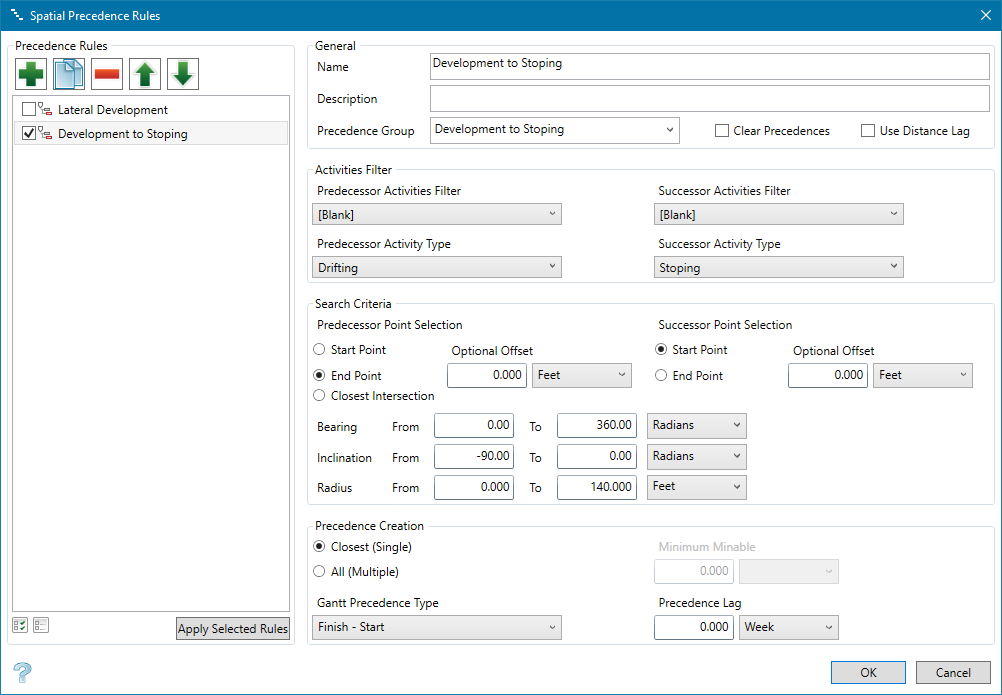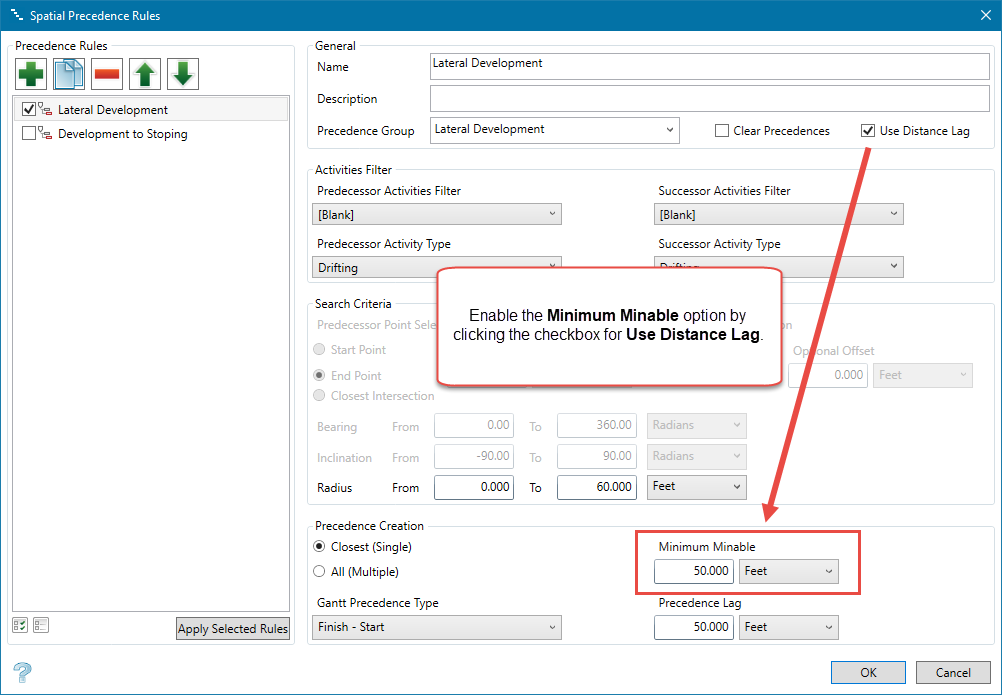Spatial Precedences
Use the Spatial Precedence panel to create, edit, or remove precedence rules for spatial precedences.
Note: You can use Lava scripts to run automated tests for many of the most common options when setting up your project.
Instructions
On the Precedences tab, in the Vulcan Spatial group, click Spatial Precedences to display the Spatial Precedence Rules panel.

Spatial Precedence Rules
Adding and Defining a New Precedence Group
Click Add ![]() to add a new entry, or press the INSERT key on your keyboard.
to add a new entry, or press the INSERT key on your keyboard.
Modifying a Precedence Group
Select an entry and modify the displayed information as needed.
Copying a Precedence Group
Select an entry and click Copy ![]() to create a copy of the selected entry or press Ctrl + C.
to create a copy of the selected entry or press Ctrl + C.
Removing a Precedence Group
Select an entry and click Remove ![]() to remove the selected entry or press Delete. The entry can only be removed if it is not being used in the project.
to remove the selected entry or press Delete. The entry can only be removed if it is not being used in the project.
Moving a Precedence Group
Select an entry and click Up ![]() or Down
or Down ![]() to move the entry up or down in the list, or press Ctrl + Up arrow or Ctrl + Down arrow.
to move the entry up or down in the list, or press Ctrl + Up arrow or Ctrl + Down arrow.
General
Name
Enter a name for the report.
Description
Enter a brief description of the report.
Clear Precedences
Select this to clear any precedences that are already assigned to an activity.
If you are running a new lateral development rule and you have previously run a similar rule, it will delete the precious rule and then create the new one.
Use Distance Lag
Use this to set the lag distance by distance instead of just by time. When this is selected, the Minimum Minable option to set the time at the bottom of the panel will become available.

Activities Filter
Predecessor / Successor Activities Filters
Select filters for the predecessor and successor activities. These lists are populated by the list generated in View > Filters.
Predecessor / Successor Activity Types
Select activity types for the predecessor and successor activities. These lists are populated by the list generated in Setup > Activity Types.
Search Criteria
These result in a conical shape for successors to search for predecessors within the specified parameters.
Predecessor / Successor Point Selection
Select Start Point, End Point, or Closest Intersection to indicate the method of point selection. The precedence will be created from either the start, the end of closest intersection of the predecessor, or either the start or end of the successor.
Optional Offset
Enter a value for the offset and then select the unit of measure from the list. he closest intersection and optional offset allow the Gantt bars to be split and precedences created between parts of activities. The optional offset only works for design data and is in reference to the nominated point (start, end, or closest intersection).
Bearing
This is the range which is used by the successor activities to search for a predecessor.
Inclination
This is the vertical angle range to be used for successor activities to search for a predecessor.
Radius
This is the distance range to be used by successor activities to search for a predecessor.
Precedence Creation
Closest (Single) or All (Multiple)
Select the method of precedence creation.
Gantt Precedence Type
Select the Gantt precedence type from the list.
Minimum Minable
If there is a lag between the predecessor and successor, enter a threshold for the minimum mining distance and select the unit of measurement.
Precedence Lag
If there is a lag between the predecessor and successor, enter the time and select the unit of measure from the list.
Apply Rule
Click Apply Rule to apply rule changes to precedences.

